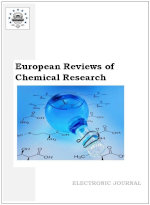1 December 25, 2022
Chemical Research
1. Viktor N. Bekhterev, Svetlana N. Gavrilova, Eugenia G. Neskubina, Igor N. Shipanov
Innovations in the Preliminary Preparation of Biological Samples in Chemical and Toxicological Researches
European Reviews of Chemical Research. 2022. 9(1): 3-12.
Number of views: 192 Download in PDF
European Reviews of Chemical Research. 2022. 9(1): 3-12.
Abstract:
The results and experience of applying the new principle of extraction of target organic substances from water-containing matrices, extractive freezing-out, at the stage of preliminary preparation of biological objects for instrumental analysis in chemical-toxicological and forensic chemical studies are demonstrated. It is shown that the proposed method is much cheaper than the traditionally used methods of liquid extraction and sorption extraction. The technology allows the use of hydrophilic, water-soluble extractants without any chemical modification of the sample. It compares favorably with liquid and solid-phase extraction in that it makes it possible to extract organic compounds from highly contaminated, dispersed systems immediately without the additional manipulations necessary in this case. The developed methods for the determination of drugs and narcotic substances in combination with various types of chromatographic identification are selective, significantly reduce the background of extractive components and take less time due to the one-stage sample preparation procedure. This is beneficial in terms of improving the quality and reliability of expert research. A minimum amount of reagents and consumables is required, which meets the requirements of green chemistry. To date, the extractive freezing-out technique under the influence of a field of centrifugal forces has already been implemented as a laboratory device – a cryoextractor EFC. The introduction of extractive freezing-out into the practice of forensic chemical laboratories does not require special professional training of personnel.
The results and experience of applying the new principle of extraction of target organic substances from water-containing matrices, extractive freezing-out, at the stage of preliminary preparation of biological objects for instrumental analysis in chemical-toxicological and forensic chemical studies are demonstrated. It is shown that the proposed method is much cheaper than the traditionally used methods of liquid extraction and sorption extraction. The technology allows the use of hydrophilic, water-soluble extractants without any chemical modification of the sample. It compares favorably with liquid and solid-phase extraction in that it makes it possible to extract organic compounds from highly contaminated, dispersed systems immediately without the additional manipulations necessary in this case. The developed methods for the determination of drugs and narcotic substances in combination with various types of chromatographic identification are selective, significantly reduce the background of extractive components and take less time due to the one-stage sample preparation procedure. This is beneficial in terms of improving the quality and reliability of expert research. A minimum amount of reagents and consumables is required, which meets the requirements of green chemistry. To date, the extractive freezing-out technique under the influence of a field of centrifugal forces has already been implemented as a laboratory device – a cryoextractor EFC. The introduction of extractive freezing-out into the practice of forensic chemical laboratories does not require special professional training of personnel.
Number of views: 192 Download in PDF
History of Science
2. Anvar M. Mamadaliev
Touches to the Biographical Portrait of Sergei Pavlovich Kostychev (1877–1931) (to the 150th Anniversary of his Birth)
European Reviews of Chemical Research. 2022. 9(1): 13-17.
Number of views: 217 Download in PDF
3. European Reviews of Chemical Research. 2022. 9(1): 13-17.
Abstract:
The paper is devoted to the biography and scientific research of the famous Russian botanist, biochemist and microbiologist Sergei Pavlovich Kostychev (1877–1931). His life path, teaching and scientific activities are highlighted. There were used as research methods the content analysis, biographical analysis and the synthesis method. Kostychev's findings are not only of theoretical value, but are also widely used in industry even at the present stage. The scientist was educated at the Faculty of Physics and Mathematics of St. Petersburg University. His research interests include plant photosynthesis, fungal microbiology, as well as philosophical aspects of chemistry, biology, and the origin and spread of life on the Earth. Besides the scientific activities, he was actively engaged in teaching (taught and headed the department at LSU) and administrative (management of the Laboratory of Plant Biochemistry of the USSR Academy of Sciences and the State Institute of Experimental Agronomy) work.
The paper is devoted to the biography and scientific research of the famous Russian botanist, biochemist and microbiologist Sergei Pavlovich Kostychev (1877–1931). His life path, teaching and scientific activities are highlighted. There were used as research methods the content analysis, biographical analysis and the synthesis method. Kostychev's findings are not only of theoretical value, but are also widely used in industry even at the present stage. The scientist was educated at the Faculty of Physics and Mathematics of St. Petersburg University. His research interests include plant photosynthesis, fungal microbiology, as well as philosophical aspects of chemistry, biology, and the origin and spread of life on the Earth. Besides the scientific activities, he was actively engaged in teaching (taught and headed the department at LSU) and administrative (management of the Laboratory of Plant Biochemistry of the USSR Academy of Sciences and the State Institute of Experimental Agronomy) work.
Number of views: 217 Download in PDF








